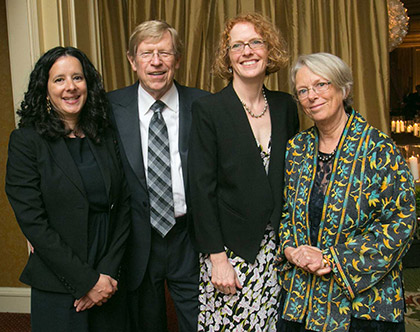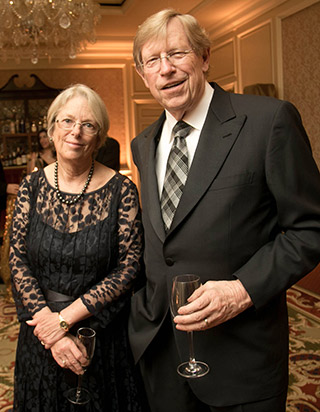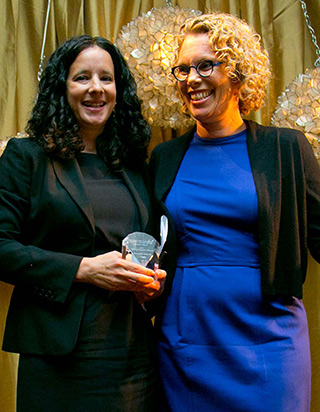By Andrew Cohen

and Pamela Samuelson at the Citation Award Dinner.
See more photos here
While their backgrounds and legal interests vary greatly, common bonds were evident among the trio honored at Berkeley Law’s Citation Award dinner March 13 in San Francisco.
“Each recipient embodies ideals that help distinguish our law school community,” Acting Dean Gillian Lester said of litigator Theodore Olson ’65, Professor Pamela Samuelson, and Assistant Clinical Professor Roxanna Altholz ’99. “Exceptional legal acumen, vigilant attention to detail, and a deep commitment to protecting fundamental rights.”
Olson won the Citation Award, the law school’s highest honor, which recognizes exceptional contributions to the bar, the bench, legal scholarship, the state, nation, and the world. Samuelson won the Faculty Lifetime Achievement Award, which honors the contributions and accomplishments of an exemplary Berkeley Law faculty member. Altholz won the Young Alumni Award, given to a graduate from the past 15 years who has made significant contributions through professional, charitable, or other public service activities.
Litigation sensation
One of the nation’s most accomplished trial lawyers, Olson spearheaded the litigation fight against Proposition 8, California’s ballot initiative banning same-sex marriage. The measure was declared unconstitutional by a federal district court—a ruling later upheld by the Ninth Circuit Court of Appeals. In 2010, Time magazine named Olson one of the world’s 100 most influential people.

Olson ’65
A longtime conservative and U.S. Solicitor General from 2001 to 2004, Olson called the right to marry “a matter of human rights.” Under his guidance, the plaintiffs called 17 expert witnesses to testify at trial; the opposition called two. Olson tried the case with David Boies—his opposing counsel in Bush v. Gore, theU.S. Supreme Court case that gave President George W. Bush victory in the 2000 presidential election.
A partner at Gibson, Dunn & Crutcher in Washington, D.C., Olson has argued 60 cases before the Supreme Court and won more than 75 percent of them. He was introduced by professor and former dean Jesse Choper, who noted that NPR called him “gay marriage’s unlikely warrior.” Olson thanked Choper for his glowing introduction, noting that his 93-year-old mother “will like hearing that very much, though she’ll probably have a rebuttal.”
With his wife, two sisters, niece, and four nephews looking on, Olson recalled Berkeley Law’s “fantastic intellectual energy” and said it offered “the finest people in the world in their fields who are so dedicated to their students… This is a fabulous institution and I’m extremely grateful for this award. It means something to me that I cannot describe.”
Professor and pioneer
A pioneer in digital copyright law, intellectual property, cyberlaw, and information policy, Samuelson has held a joint appointment at Berkeley Law and UC Berkeley’s School of Information since 1996. She is a director of the law school’s Berkeley Center for Law & Technology, and founded its Samuelson Law, Technology & Public Policy Clinic—the first of its kind.
Samuelson also leads the Copyright Principles Project, assembling top copyright experts for a multi-year project aimed at advancing copyright law amid rapid technological change. “You can’t effectively regulate something unless you actually understand what it is,” she said. “The current copyright law is 300 pages long, and we’re writing one that’s 20 pages.”
Introduced by former Dean Christopher Edley, Jr., Samuelson has published extensively in the areas of copyright, software protection, and cyberlaw. Last year she was inducted into the prestigious American Academy of Arts and Sciences. During her acceptance speech, she described shifting her focus from law review articles to amicus curiae briefs upon realizing that “if I see a train wreck coming, I should actually do something to try to stop it.”

Thankful for the Samuelson Clinic’s growth influence on other law schools representing the public interest in law and technology, she said “it’s great to be in Berkeley, where all the action is in the digital realm.” Samuelson also described exceeding her parents’ expectations. “They sent me to a junior college typing class in case their main hope for me—marrying a bank vice president—didn’t pan out…. You’ll have an idea of how much this award means to me when you know how long the road has been.”
Student becomes the teacher
While accepting her Young Alumni Award, Altholz—the mother of a 3-year-old and a 4-month-old—joked that she was simply “grateful for a night out with adult conversations.” The associate director of Berkeley Law’s International Human Rights Law Clinic also thanked the law school for its “strong tradition of nurturing and even celebrating rebellious law students.”
Moments earlier, clinic Director Laurel Fletcher reminded the crowd that Altholz was one of them, having occupied the dean’s office with other law students when California passed Proposition 209, an anti-affirmative action measure.
One of the clinic’s first students, Altholz has achieved major victories for disenfranchised populations since returning as an instructor. She has represented hundreds of victims in human rights litigation and obtained groundbreaking judgments from the Inter-American Court of Human Rights. Those rulings held governments accountable for paramilitary activity in Colombia, state-sanctioned murders in Guatemala, torture and arbitrary detention in Ecuador, and discriminatory practices in the Dominican Republic.
Altholz conveyed gratitude for Berkeley Law, which she said “participates so actively in global human rights movements.” She also thanked Fletcher, “who continues to teach me as much today as when I was her student. I’m so blessed to have her as a colleague and mentor.”
See more images here: